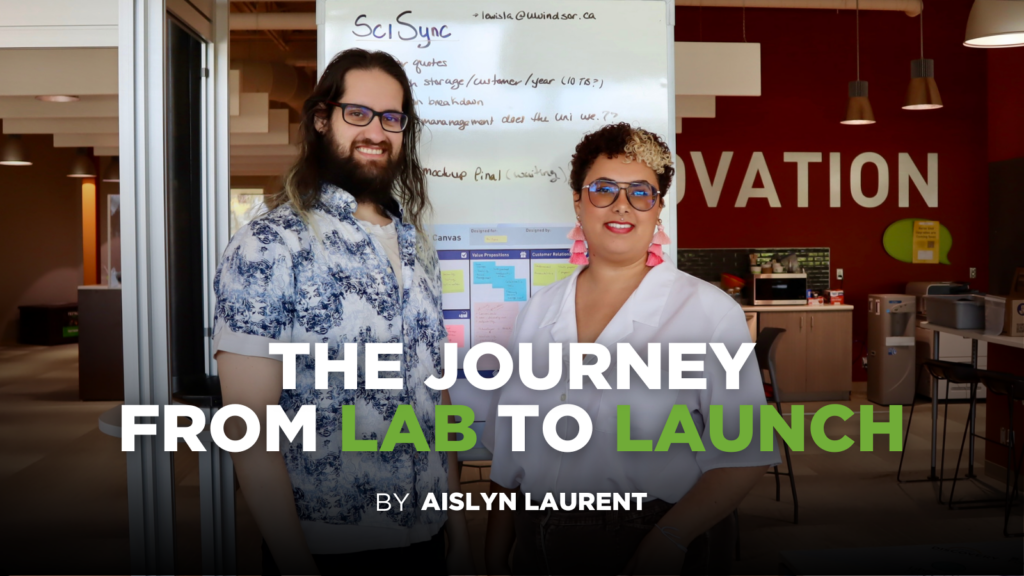Home » Lab to Launch: The Fast-Track from Research to Start-up
Lab to Launch: The Fast-Track from Research to Start-up

One graduate’s experience taking an idea from the research lab to market ready start-up.
Graduate students often discuss a career in academia as if it’s their only option. The distance from defense to a PhD or postdoctoral position often feels shorter than the leap to the job market. There’s a reason for that; students exist in a bubble filled with other researchers, and those who’ve made it their career almost assuredly took the tenure-track to achieve that stability.
Despite this, the skills of successful founders and ambitious investigators have extensive overlap. Ideas created in the lab, while designed primarily with publication in mind, solve real-world problems and have the potential for innovation in the market. Developing plans, crafting compelling stories, building on failure and tolerating risk are all key parts of any research journey. These foundational similarities should lead to a rich culture of graduate level entrepreneurship – but the data shows this isn’t the case. Of the approximately 26 thousand individuals graduating with a master’s degree in Ontario, less than 3% will pursue self-employment upon graduation.

My journey did not begin with entrepreneurship in mind, but instead with a problem that nagged at me throughout my work.
And so it shouldn’t come as a surprise that my personal journey did not begin with entrepreneurship in mind, but instead with a problem that nagged at me throughout my work. While my lab focused on biomembranes and small angle neutron scattering, my day to day was software development and data analytics. Large instruments generate equally large and complex datafiles, and it was my job to create tools that allowed group members to extract meaningful results. The challenge was managing the data securely without slowing things down. Members of my group were meticulous and well organized – the chaos wasn’t for lack of effort. Just as they needed tools to process their measurements, they needed tools to manage their files.
To me, the solution was obvious – build a platform designed around the needs of scientists that made data easy to store, access, and manage. Talking to other grad students validated my idea instantly. It was a pain point we all had.
Initially I thought an open source solution was best – published and subsequently managed on a shoestring academic budget. Perhaps predictably, there was no good home for the project with the institution. Lab heads may have been interested, but it wasn’t part of their core work. The greatest challenge would be maintaining such a tool long enough to be worth implementing.

“I realized I could validate our idea the same way I did a new research project.”
So my idea ended up on the backburner, until it finally came time to defend and find my next opportunity. It was only after I had exited the lab and breathed the fresh outside air that it occurred to me that tenure track had, in fact, never been something I was interested in. That desire floated off along with my presentation anxiety. It was at that moment that I committed to the possibility of making my data management idea into something more tangible. I connected with a collaborator I knew I could trust and had worked with before – Dr. Paul Meister, formerly of the Gauld computational research group and UK’s Institute for Cancer Research – and got to work.
The Founders program, run through the University of Windsor’s entrepreneurial support initiative, offered the training I needed to see my idea from the perspective of a C.E.O. rather than a research group member. Through the comprehensive 3 month long bootcamp I began to conceptualize the project less as a tool and more as a product. Of particular help was the customer discovery portion of the program, which led participants through the process of identifying customers and validating the idea based on real market forces. The change in perspective was critical to our success.
“In the beginning, I felt like I understood the customer because I was the customer.” Paul would later explain. “As we continued through the program I realized I could validate our idea the same way I did a new research project. Finding the reason why it would work was something I knew I could accomplish. Founders helped me reframe my thinking in a business context.”
In the absence of the industrial research development operations of the 60s, we need to support [graduates] ambition on a more individual scale.
More than anything, the Founders program showed me that founding a start-up was genuinely possible with the right support and expertise. It’s my strong belief that the path to Canadian leadership in innovation is blazed by those with the passion to push past challenges and bring their solution to those who need it most. Scientists work to create a better world for everyone, and in the absence of the industrial research development operations of the 60s, we need to support their ambition on a more individual scale.
For me, entrepreneurship continues to be an exciting journey, and I’m thankful for the Founders program and the team that worked so hard to deliver it. I can’t wait to see how far I can take my idea. I hope we’re able to continue to support graduates in Windsor, so they might do the same – seeing beyond academia to the fresh possibilities beyond.
WEtechAlliance
https://www.WEtech-alliance.com/
WEtech Alliance has served as a catalyst for technology and innovation in the Windsor-Essex and Chatham-Kent, Ontario regions since 2011. We’re a non-profit organization that provides entrepreneurs and companies with business services, training, I.P. and commercialization support, mentorship and strategic connections to help bring new ideas to market, scale to the next level and build a dynamic culture and a community of innovation.

